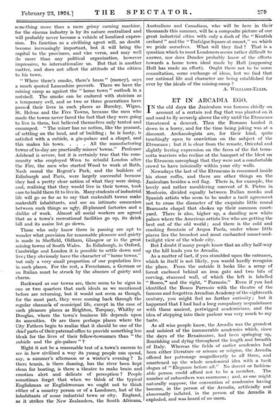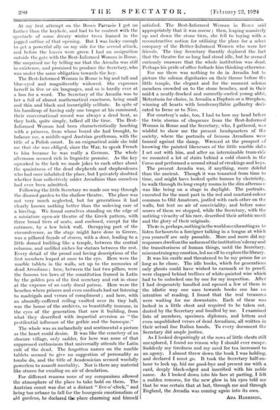ET IN ARCADIA EGO.
IN the old days the Janiculum was famous chiefly on account of a certain red flag that was planted on it and used to fly securely above the city until the Etruscans threatened a descent. Then the Romans hauled it down in a hurry, and for the time being joking was at a discount. Archaeologists are, for their kind, quite touchingly open to conviction on the subject of the Etruscans ; but it is clear from the remote, Oriental and slightly leering expression on the faces of the flat terra- cotta warriors who recline at the banquet of the blest on the Etruscan sarcophagi that they were not a comfortable crowd to have inimically within your city walls.
Nowadays the last of the Etruscans is consumed inside his stone coffin, and there are other things on the Janiculum besides a red' flag. There is, for example, the lovely and rather mouldering convent of S. Pietro in Montorio, divided equally between Italian monks and Spanish artists who seem to be under a tacit agreement not to cross the diameter of the exquisite little round Bramante chapel that chokes up their common court- yard. There is also, higher up, a dazzling new white palace where the American artists live who are getting the best out of the old world ; and there is the cold and crashing fountain of Acqua Paola, under whose little piazza lies the broadest and most enchanted sunset-and- twilight view of the whole city.
But I doubt if many people know that an alley half-way up the hill leads you to Arcadia.
As a matter of fact, if you stumbled upon the entrance, which in itself is not likely, you would hardly recognise the place. From the outside it looks like a scrap of forest enclosed behind an iron gate and two bits of curving, stuccoed wall, of which the left is labelled " Bosco," and the right, " Parrasio." Even if you had identified the Bosco Parrasio with the theatre of the famous and forgotten Arcadian Academy of the eighteenth century, you might feel no further curiosity ; but it happened that I had had a long compulsory acquaintance with those ancient, periwigged academicians, and the idea of stepping into their parlour was very much to my taste.
As all wise people know, the Arcadia was the grandest and noisiest of the innumerable academies which, since the days of the Renaissance, had been springing up, flourishing and dying-throughout the length and breadth of Italy. Whereas the fields of earlier academies had been either literature or science or- religion, the Arcadia offered her patronage magnificently to all three, and nuartened up- the whole academical idea with a tacit slogan of- " Elegance before all." No decent or fashion- able person could afford not to be a member. The number of subscribers was enormous ; and, as one might naturally suppose, the• convention of academies having become, in the person of the Arcadia, artificially and abnormally inflated, in the person of the Arcadia it exploded, and was heard of no more. At my first attempt on the Bosco Parrasio I got no farther than the keyhole, and had to be content with the spectacle of some dreary winter trees framed in the jagged outline of that opening. But I was lucky enough to get a powerful ally on my side for the second attack, and before the leaves were green I had an assignation outside the gate with the Best-Informed Woman in Rome. She surprised me by telling me that the Arcadia was still in existence, and promised to produce the Secretary, who was under the same obligation towards the key.
The Best-Informed Woman in Rome is big and tall and blue-eyed and magnificently widowed. She expresses herself in five or six languages, and so is hardly ever at a loss for a word. The Secretary of the Arcadia was to her a foil of almost mathematical exactness, being small and thin and black and incorrigibly celibate. In spite of his handicap of having only one tongue at his command, their conversational record was always a dead heat, as they both, quite simply, talked all the time. The Best- Informed Woman had been characteristically lunching with a princess, from whose board she had brought, to balance me, a middle-aged Austrian gentleman, with the title of a Polish count. In an enigmatical aside she told me that she was obliged, since the War, to speak French to him because he was really a German. The whole :afternoon seemed rich in linguistic promise. As the key squeaked in the lock we made jokes to each other about the quaintness of the dead shepherds and shepherdesses who had once inhabited the place, but I privately doubted whether four collectively odder Arcadians than ourselves had ever been admitted.
Following the little Secretary we made our way through the disused garden to the shallow theatre. The place was not very much neglected, but for generations it had clearly known nothing better than the unloving care of a hireling. We found ourselves standing on the edge of a miniature open-air theatre of the Greek pattern, with three broad tiers of scats, and enclosed, except for the entrance, by a low brick wall. Occupying part of the circumference, as the stage might have done in Greece, was a pillared façade of stucco, with a door, leading to a little domed building like a temple, between the central columns, and unfilled niches for statues between the rest. Every detail of the proud and loving descriptions of the first members leaped at once to the eye. Here were the marble tablets in the walls, set up to the memories of dead Arcadians ; here, between the last two pillars, were the famous ten laws of the constitution framed in Latin by the golden pen of the first secretary and cut in stone at the expense of an early ducal patron. Here were the benches where princes and even cardinals had sat listening to madrigals and verses of compliment ; and here, with an absuidly-coffered ceiling vaulted over its tiny hall, was the house of the archives, so beautifully immune, in the eyes of the generation that saw it building, from what they desCribed with impartial aversion as " the pestilential influence of the gothic and the barocqUe."
. The whole was as melancholy and sentimental a picture as the heart could desire. It was like the cemetery of an obscure village, only sadder, for here was none of that suppressed enthusiasm that universally attends the Latin cult of the dead. The forgotten names on the marble tablets seemed , to .give no suggestion of personality as tombs do, and the. title of Academician seemed woefully ,powerless to assault mortality. Nor is there any material like stucco for exuding an air of desolation.
. For different reasons none of my companions allowed the atmosphere of the place to take hold on them. The Austrian count was due_ at a distant " five-o'-clock," and being too urbane to fall for the bourgeois emotionalism of old gardens, he declared the place charming and himself satisfied. The Best-Informed Woman in Rome said appropriately that it was morne ; then, leaping massively up and down the stone tiers, she fell to toying with a reconstructive notion for utilizing the place for a select company of the Better-Informed Women who were her friends. The tiny Secretary fluently deplored the fact that the theatre for so long had stood idle, but he seemed curiously unaware that the whole institution was dead. Perhaps his pride of office forbade him thinking otherwise.
For me there was nothing to do in Arcadia but to picture the solemn dignitaries on their throne before the little temple, the elegant and for the moment solemn members crowded on to the stone benches, and in their midst a neatly-frocked and correctly-curled young abbe, Metastasio for choice, in Arcadia a Daphnis or a Strephon, winning all hearts with hendecasyllabic gallantry dedi- cated to Irene or to Nice.
For courtesy's sake, too, I had to bow my head before the twin storms of eloquence from the Best-Informed Woman in Rome and the Secretary, who, I gathered, wcs wishful to show me the present headquarters of ti e society, where the portraits of famous Arcadians weic housed against the damp. Warmed at the prospect of knowing the painted likenesses of the little marble slabs I set out with him, and after an interminable tram-ride we mounted a lot of stairs behind a cold church in the Corso and performed a second ritual of creakings and keys.
The present Arcadia was, if anything, more doleful than the ancient. Though it was tenanted from time to time, and might have looked quite human by electricity, to walk through its long empty rooms in the dim afternoon was like being on a stage in daylight. The portraits, executed for the most part in the red and mustard-colour common to Old Amateurs, jostled with each other on the walls, but lent no air of conviviality, and before some scores of them we stopped, while the Secretary, with the untiring vivacity of his race, described their artistic merit and the glory of their originals.
Thc re is, perhaps, nothing in the world so exhausting as to listen for hours to a foreigner talking in a tongue at which you yourself are only passable. More and more did my responses dwell on the sadness of the institution's decay and the transitoriness of human things, until the Secretary, misconstruing my emotion, led me off to explore the library.
It was his castle and threatened to be my prison for as long as he chose. The idle books, which for generations only ghosts could have wished to earmark or to pencil, were clapped behind trellises of white-painted wire which had to be unlocked one by one for my inspection. After I had desperately handled and opened a few of them in the idiotic way one uses towards books one has no intention of reading, I found that the real treasures were waiting for me downstairs. Each of these was locked in a little chest and required to be taken out, dusted by the Secretary and fondled by me. I examined lists of members, specimen diplomas, and letters and even unpublished verses of dead Arcadians, all written in their actual fine Italian hands. To every document the Secretary did ample justice.
As I looked despairingly at the rows of little chests still unexplored, I found no reason why I should ever escape. Suddenly my tiredness and my need for tea increased to an agony. I almost threw down the book I was holding, and declared I must go. It took the Secretary half-an- hour to lock up, bid me good-bye and present me with a card, deeply black-edged and inscribed with his noble name. As I looked down into his face at parting, I felt a sudden remorse, for the new glow in his eyes told me that he was certain that at last, through me and through England, the Arcadia was coming again into its own.











































 Previous page
Previous page